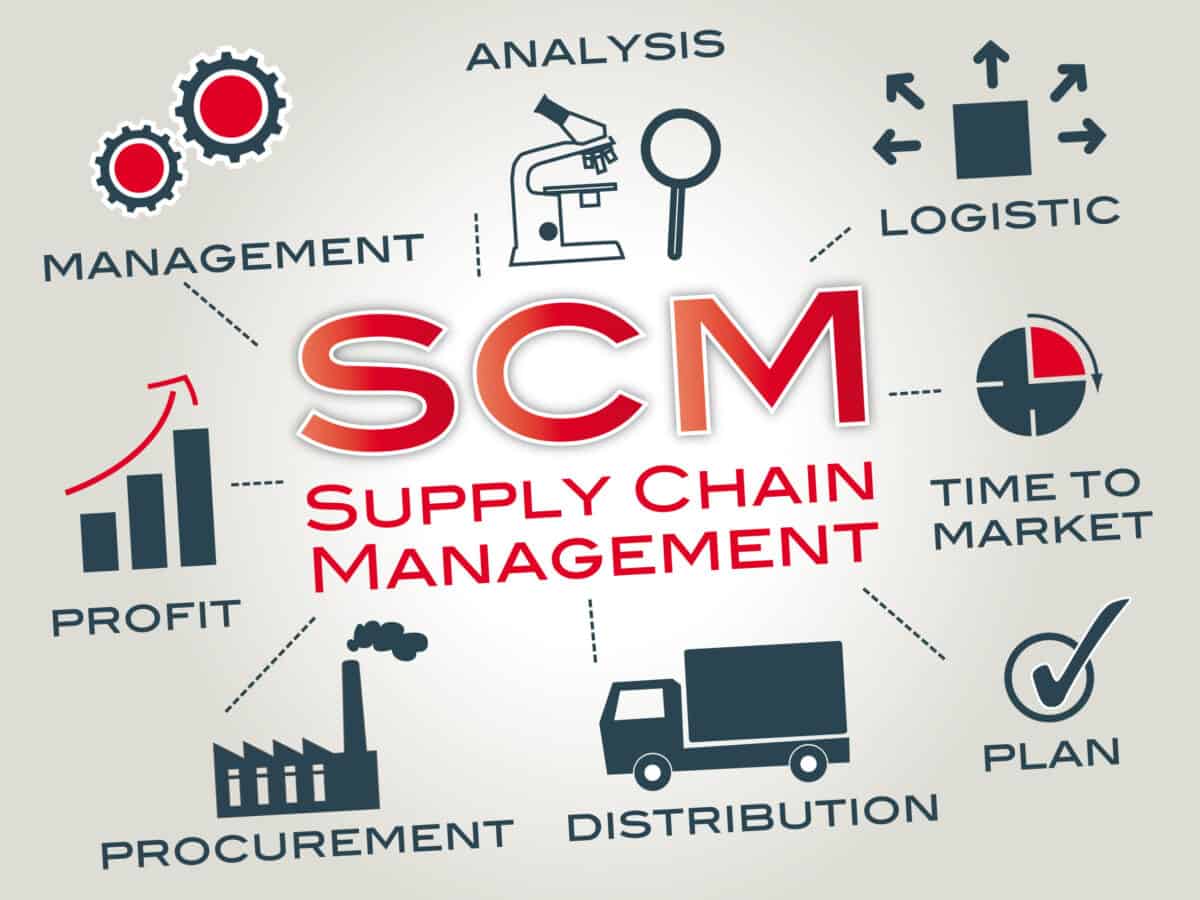The role of a Supply Chain Manager carries the responsibility of overseeing and managing every stage of the production flow for a company. This includes purchasing raw materials, delivering those materials to various points, ensuring the company makes enough product to meet customer demand, and delivering the final product to the right destinations on time and within budget. In effect, the Supply Chain Manager coordinates, organizes, and oversees all the activities involved in the production and distribution of a company’s goods and services.
Similar Job Titles
The Supply Chain (SC) Manager has the responsibility of managing and overseeing the production flow. However, depending on the size of the company, the SC Manager may have a team of individuals with specific roles within the overall process in order to maximize efficiency. This team works with stakeholders in areas such as procurement, logistics, and operations. Other employee titles that are similar to the Supply Chain Manager include:
- Supply Chain Analyst
- Supply Chain Coordinator
- Supply Chain Strategist
- Director of Supply Chain
- Vice President of Supply Chain
Typical Job Titles of Direct Reports
Subordinates who report to the Supply Chain Manager are Supply Chain Coordinators and employees in Warehouse & Logistics. Also, any permanent and temporary shipping and materials employees report to the Supply Chain Manager.
Supply Chain Manager Job Description
The Supply Chain Manager position oversees the importation of raw materials and creation of products. The Supply Chain Manager both tracks the materials as they are combined and shaped to form new products as well as monitors the items throughout the product development process. They ensure that supply is available to meet client demand. This role is also responsible for creating a delivery system ensuring the maximum amount of product is produced and shipped to customers or other manufacturers. Additionally, the SC Manager is tasked with continuously reviewing logistical functions and identifying areas of improvement in order to have efficiency in the production process.
A supply chain manager must be knowledgeable in process management and development in order to have an understanding of how the company works. They coordinate, organize, and manage all logistics in the production and distribution process of a company’s goods. Basically, supply chain managers oversee the entire life cycle of a product.
The SC manager also manages people on the teams involved in the production process as well as the clients who receive the product. Supply chain managers must be highly proficient in networking and understanding the needs of the client. They must be successful leaders to lead teams, manage financial budgets, and develop a product that meets the needs of clients.
Some core responsibilities of the Supply Chain Manager include:
- Creating business relationships with suppliers and clients
- Directing allocation of materials, supplies, and products
- Developing high-quality products
Core responsibilities and duties include:
- Collaborating with departments and stakeholders to identify and maintain resources needed to establish and provide an effective supply chain
- Establishing performance metrics for measurement, comparison, and evaluation of factors affecting the supply chain
- Maintaining detailed inventories of materials and supplies located in the factory, at other sites, and in the company
- Maintaining required quantity of supplies and materials to optimize production
- Analyzing current inventories and procedures
- Developing policies to increase efficiency throughout the supply chain and implementing any subsequent changes to processes
- Identifying optimal shipment and transportation routes
- Assessing needs for material-handling equipment and staffing
- Making recommendations to ensure efficient loading, unloading, movement, and storage of materials
- Negotiating prices for raw materials and delivery from suppliers
- Monitoring performance of suppliers by assessing their ability to meet quality and delivery requirements
- Identifying and qualifying new suppliers, working with other departments
- Functioning as part of the team coordinating engineering changes, product line extensions, or new product launches to ensure timely and orderly material and production flow transitions
Soft Skills:
- Detail-oriented
- Organized
- Excellent verbal and written communication
- Excellent interpersonal and negotiation
- Strong supervisory and leadership
- Analytical and problem-solving
Technical Skills:
- Knowledge of logistics, supply chain management, and transportation
- Financial planning
- Forecasting
- Supply Chain Management software (SCMS) tools used in executing supply chain transactions, managing supplier relationships, and controlling associated business processes (some of the top SCMS: E2open, SAP SCM, Logility, Perfect Commerce, Oracle SCM, Infor SCM, JDA SCM, Manhattan SCM, Epicor SCM, Descartes SCM, Watson Supply Chain, and BluJay SCM)
Required/Desired Education and Qualifications:
- Bachelor’s degree in Business or related field, focusing on supply chain management and operations
- Masters degree, preferred by some companies
- Usually, at least five years of experience as a supervisor, manager, or similar relevant position
Other helpful, relevant certifications and skills:
- Certified Purchasing Professional
- Certified Supply Chain Professional
- Certified in Production and Inventory Management
- Certificate in Materials Management
- Knowledge in Theory of Constraints (TOC), Lean Manufacturing, and Six Sigma
A Day in the Life of a Supply Chain Manager
A day in the life of a supply chain manager includes analyzing data, making decisions, and gathering information from automated sources, employees, clients, and other stakeholders. For example, the SC manager must determine appropriate equipment and staffing levels to load, unload, move, or store materials. This activity will involve computer work with spreadsheets, SCMS tools, and communications with other departments.
A big part of the workday is spent conferring with supply chain planners to forecast demand or create supply plans that ensure availability of materials or products. A typical day may find the supply chain manager negotiating prices and terms with suppliers, vendors, or transportation sources. Everyday includes performing analytical work to analyze inventories and to determine how to increase inventory turns, reduce waste, or optimize customer service.
There are tasks that a supply chain manager may not do everyday, but that are certainly a part of each week or month. The SC Manager analyzes information about supplier performance and procurement program success. He/she also monitors suppliers’ activities to assess performance in meeting quality or delivery requirements. Either weekly or monthly, the SC Manager communicates with supply chain planners to forecast demand or create supply plans that ensure the availability of materials or products. Meeting with suppliers to discuss performance metrics and provide performance feedback is an important function of an SC manager in honing an efficient system.
Typical Working Conditions for a Supply Chain Manager:
The typical setting for a supply chain manager is an office environment and a 40 (or more) hour workweek. Managers may be located in a business setting with other offices and cubicles or they may be situated just off a manufacturing or engineering floor. Usually, they need to maintain close proximity to the production or manufacturing areas that they oversee.
Supply chain managers may have to travel to other manufacturing sites when they work for a company that has multiple locations. For a global company, this could entail traveling internationally. At times, they may need to visit new vendors, partners, and suppliers when looking for new means of production or management. This activity can be finding new sources of raw materials, developing new production floors, or obtaining new manufacturers who can further work with finished products.
Technology Enhancements:
Technology is the critical backbone for getting the information necessary in making decisions regarding supply chain performance. Because of the complexity of supply chains, the Supply Chain Management role could not be accomplished without technology. The key to effective supply chains is Supply Chain Management software (SCMS), which allows supply chain managers to access every point of the supply chain from order fulfillment to compliance. There are many different companies that make SCMS, but the tools generally fall into these categories:
- Shipping Status
- Order Processing
- Lean Inventory
- Warehouse Management
- Supplier Management
- Demand Forecasting
- Analytics and Reports
- Security Features
- Compliance
Supply Chain Manager Salary Range and Benefits
The range for supply chain manager salaries falls between $102,364 and $132,770, with a median salary of $116,514. Salaries depend on education, certifications, additional skills, size of the company, geographic location, and the number of years spent in the profession. Many supply chain manager positions, especially at the senior-level, include bonuses.
Benefits for a Supply Chain Manager are a complete package including:
- Relocation assistance
- 401(k)
- 401(k) matching
- Health insurance
- Dental insurance
- Disability insurance
- AD&D insurance
- Vision insurance





